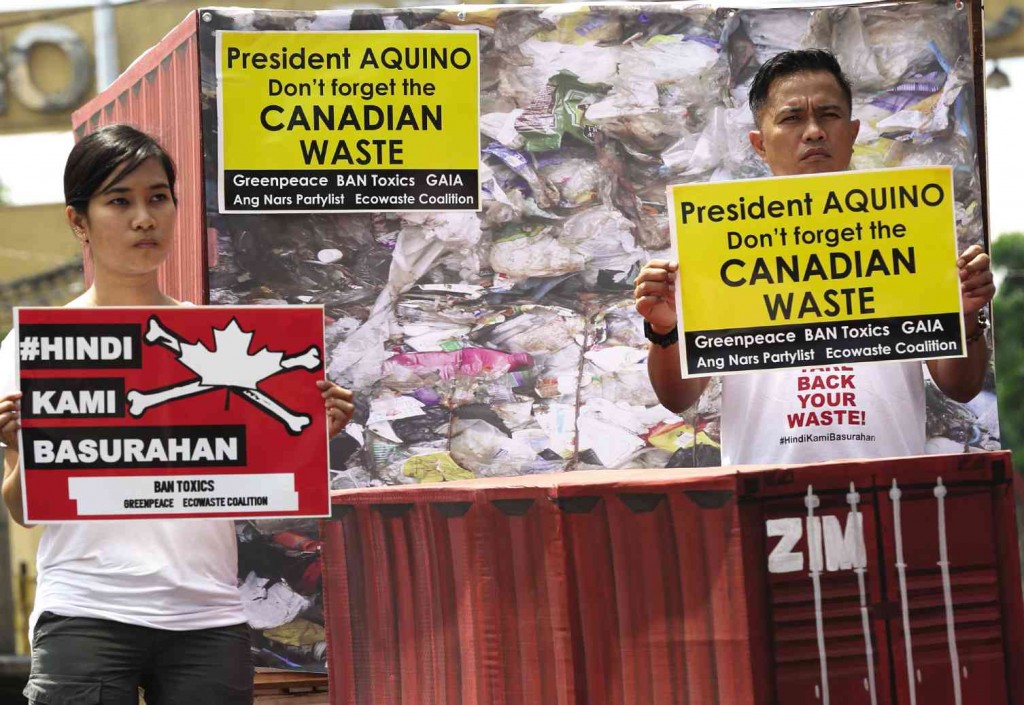
RETURN TO SENDER Protesters tell Canada to take back tons of garbage illegally shipped to a port in Manila from Canada two years ago. NIÑO JESUS ORBETA/FILE PHOTO
While environmentalists were protesting against a shipment of Canadian trash that arrived in Manila two years ago, a second batch of garbage from Canada was uncovered on May 24 by the Bureau of Customs (BOC).
According to the BOC, 48 containers purportedly carrying plastic scraps arrived in four batches between December 2013 and January 2014.
Although the BOC has yet to confirm in detail what the shipment contains, Undersecretary Jonas Leones of the Department of Environment and Natural Resources-Environmental Management Bureau (DENR-EMB) said his agency did not issue any import clearance for the second shipment so it was considered illegal.
The containers have yet to be claimed at the Port of Manila by the consignee identified as Live Green Enterprise, a company based in San Fernando City, Pampanga province.
First shipment
The first shipment of Canadian trash was discovered by customs inspectors on Jan. 21, 2014. It was supposedly carrying “scrap plastic materials for recycling” from Ontario, Canada. Examination showed the vans were filled with waste materials and garbage, a clear violation of the Toxic Substances and Hazardous Wastes Control Act of 1990.
According to the BOC, 50 containers arrived in six batches from June to August 2013 at the Manila International Container Port. These were seized by customs police who found inside “used, mixed and unsorted or heterogeneous plastic materials, including household garbage and even used adult diapers, and not homogeneous or recycle plastic scrap materials as declared by the importer.”
The importer had declared a value of P3.9 million for 19 of the 50 containers.
Ontario-based Chronic Inc. shipped the containers to Manila through its Valenzuela-based consignee Chronic Plastics. Chronic Inc.’s owner, Jim Makris, had denied in an interview with The Toronto Star that the shipment was household trash, saying it was recyclable plastic.
Charges filed
The BOC filed charges in the Department of Justice against Chronic Plastics owner Adelfa Eduardo and customs brokers Leonora Flores and Sherjun Saldon for violation of Republic Act No. 6969, the Act to Control Toxic Substances and Hazardous Nuclear Waste.
The three were also charged with violating the Tariff and Customs Code of the Philippines for illegally importing waste materials from Canada.
In April 2014, environmental and civil society groups began a campaign through online petition platform Change.org calling on the Canadian government to get back the thrash. As of December 2014, over 25,000 people had signed the petition, including 11,000 Canadians.
In March 2015, Leones said that the Philippines would take care of disposing of the garbage. He said negotiations with Canada were taking too long and the cost of “treating” the garbage would be charged anyway to Chronic Plastics.
No used diapers
Leones said contrary to reports, no used adult diapers were found in the vans, which he said contained “mixed scrap plastic and household waste.”
The DENR had initially asked the Canadian government to take back the trash, citing the 1992 Basel Convention on the Control of Transboundary Movements of Hazardous Wastes of which the Philippines and Canada are signatories.
Prior to President Aquino’s state visit to Canada in May, labor groups and environmental organizations demanded that he ask the Canadian government to take back the containers, but Malacañang responded that “the legal process [was] continuing.”
The trash issue didn’t come up during Aquino’s talks with Canadian officials. He told reporters that relevant agencies were already acting on the issue and that in December 2014, prosecutors had filed about 15 criminal cases against the importer Chronic Plastics and its licensed brokers.
Demand dropped
Environment Secretary Ramon Paje also said the government had dropped its demand that Canada take back the containers “for the sake of our diplomatic relations.”
Assistant Secretary Charles Jose, spokesman for the Department of Foreign Affairs, confirmed in May that “reexporting the trash is no longer part of the solution since Canada has no obligation to take it back. It is purely a commercial transaction.” He said Canada insisted the shipment was a private commercial transaction and that Ottawa had no obligation to get it back.
Canadian Ambassador Neil Reeder said the solution was to dispose of the trash in the Philippines. “Both governments are going to work toward having the garbage treated locally and in a sustainable manner and that case will be closed,” Reeder said.
Canada did not have the means “to force the shipper by law to take the waste back to Canada,” he said. “The Philippines doesn’t have the legal means to force the shipper to take the waste back to Canada. So we’re going to deal with that locally.”
Source: Inquirer Archives